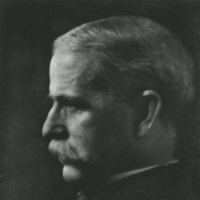The Proud Lady
When Stiivoren town was in its prime
And queened the Zuyder Zee,
Its ships went out to every clime
With costly merchantry.
A lady dwelt in that rich town,
The fairest in all the land;
She walked abroad in a velvet gown,
With many rings on her hand.
Her hair was bright as the beaten gold,
Her lips as coral red,
Her roving eyes were blue and bold,
And her heart with pride was fed.
For she was proud of her father’s ships,
As she watched them gayly pass;
And pride looked out of her eyes and lips
When she saw herself in the glass.
“Now come,” she said to the captains ten,
Who were ready to put to sea,
“Ye are all my men and my father’s men,
And what will ye do for me?”
“Go north and south, go east and west,
And get me gifts,” she said.
“And he who bringeth me home the best,
With that man will I wed.”
So they all fared forth, and sought with care
In many a famous mart,
For satins and silks and jewels rare,
To win that lady’s heart.
She looked at them all with never a thought,
And careless put them by;
“I am not fain of the things ye brought,
Enough of these have I.”
The last that came was the head of the fleet,
His name was Jan Borel;
He bent his knee at the lady’s feet,—
In truth he loved her well.
“I’ve brought thee home the best i’ the world,
A shipful of Danzig corn!”
She stared at him long; her red lips curled,
Her blue eyes filled with scorn.
“Now out on thee, thou feckless kerl,
A loon thou art,” she said.
“Am I a starving beggar girl?
Shall I ever lack for bread?”
“Go empty all thy sacks of grain
Into the nearest sea,
And never show thy face again
To make a mock of me.”
Then Jan Borel, he hoisted sail,
And out to sea he bore;
He passed the Helder in a gale
And came again no more.
But the grains of corn went drifting down
Like devil—scattered seed,
To sow the harbor of the town
With a wicked growth of weed.
The roots were thick and the silt and sand
Were gathered day by day,
Till not a furlong out from land
A shoal had barred the way.
Then Stavoren town saw evil years,
No ships could out or in,
The boats lay rotting at the piers,
And the mouldy grain in the bin.
The grass—grown streets were all forlorn,
The town in ruin stood,
The lady’s velvet gown was torn,
Her rings were sold for food.
Her father had perished long ago,
But the lady held her pride,
She walked with a scornful step and slow,
Till at last in her rags she died.
Yet still on the crumbling piers of the town,
When the midnight moon shines free,
woman walks in a velvet gown
And scatters corn in the sea.




